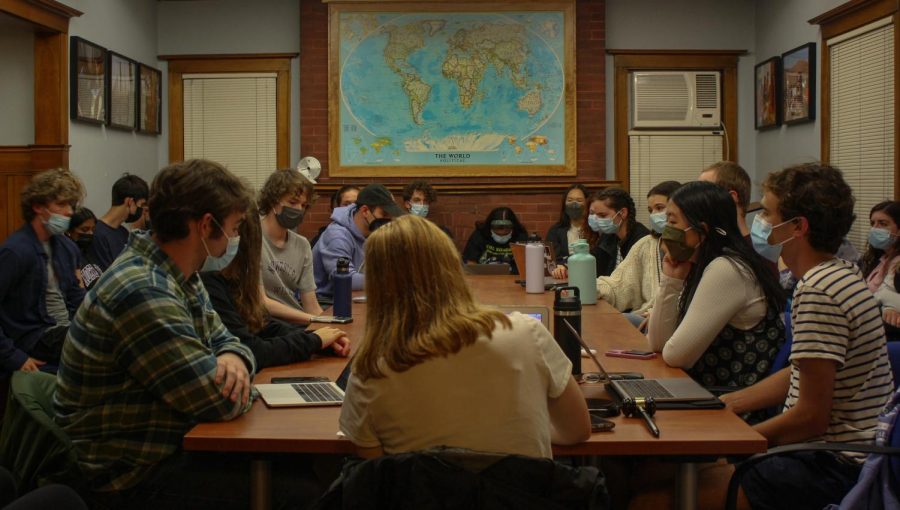Should journalists remain strictly objective? Political Union majority votes yes
Rebecca Shaid/The Daily Northwestern
NU Political Union meets for a debate on journalistic objectivity Monday night. The group holds regular debates where students are invited to share their views on political issues and engage in dialogue with their peers.
October 12, 2021
Students voted in favor of prioritizing journalistic objectivity over advocacy at Monday night’s Political Union debate.
Political Union, a nonpartisan student group, regularly hosts member-led debates centering around a political issue, where attendees vote on a consensus. Monday’s debate was led by Weinberg junior Will Secker, who was pro-objectivity, and Medill junior Spencer Allan, a former Daily staffer, who argued in favor of advocacy in journalism.
Secker said he views objectivity as a standard for journalistic expression. Objectivity is critical to news consumers, he said, because it establishes trust in the free press and ensures that the public is provided with accurate information.
“Objectivity is a good idea to strive for because it’s predicated on truth, fairness, facts and reality,” Secker said. “And it’s also good in its impact, because objectivity helps keep citizens informed in a reliable way. It doesn’t try to spin narratives, or help readers come to predetermined conclusions which may warp our view of reality.”
Journalists have a responsibility to news consumers to uncover truths about society without crossing the line into advocacy or bias, Secker said. While he stressed that journalists shouldn’t be activists, he said objective reporting can still support the causes of activists as long as it’s truthful.
Allan said he originally began his journalism studies believing objectivity was a principle he could stand behind. However, as he continued his reporting, he found the remaining objective was less simple than it initially seemed.
Journalism is inherently biased, Allan said, because editorial decisions on coverage, interviews and included information can have a significant impact on the narrative of a story.
The press has a responsibility to platform the voices of the oppressed or unheard, he said, not remain fully neutral.
“The pursuit of objectivity in journalism has historically blinded us journalists to having empathy toward people in their causes,” Allan said. “When we try to pursue objectivity absolutely, we end up sort of ignoring the more human aspects of the field of journalism.”
Allan agreed with Secker that journalists don’t need to be activists, but he stressed that when journalists attempt to stay out of the fray ideologically, the status quo is often reinforced. Objectivity in reporting, he said, is a barrier to advocacy.
However, some students didn’t believe that either journalistic value needed to be prioritized over the other. While she prefers journalists check their biases, Weinberg sophomore Yasmeen Mohammed Rafee said she believes the media industry as a whole can strike an ideological balance.
“We can still have both advocacy and objectivity, I just think that mainstream media should be objective,” Mohammed Rafee said.
Weinberg senior Anna Cork said she was happy the debate topic was more abstract this time, since most Political Union debates center on specific policy decisions.
Cork, who voted against prioritizing objectivity, said the opposing side made some points during the discussion that resonated with her. However, in her view, all ideologies are fundamentally relative.
“Everyone has very different opinions of what news is objective and how objectivity works… which is I guess why I don’t think objectivity is really a thing that exists,” Cork said.
Email: joshuaperry2023@u.northwestern.edu
Twitter: @joshdperry
Related Stories:
— Noam Chomsky talks climate change, labor rights and free speech at Political Union event
— Does ASG really matter for students? Political Union majority votes yes
— Should the government bail out big businesses? Political Union discusses



